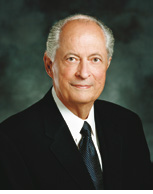 "By understanding and obediently following God’s plan, we keep ourselves from wandering
off | |
The Plan |
 By Elder
|
|
I have often pondered the hopelessness of God’s children wandering in the dark and dreary world,
not knowing who they are, where they came from, why they are here on earth, or where they are
going after their mortal lives. We need not wander. God has revealed eternal truths to answer
these questions. They are found in His great plan for His children. In the scriptures this plan
is known as the “plan of redemption,”1 the “plan of happiness,”2 and the
“plan of salvation.”3
By understanding and obediently following God’s plan, we keep ourselves from wandering off the path that leads back to our Heavenly Father.4 Then, and only then, can we live the kind of life He leads, which is “eternal life, . . . the greatest of all the gifts of God.”5 The gift of eternal life is worth any effort to study, learn, and apply the plan of salvation. All humankind will be resurrected and receive the blessing of immortality. But to achieve eternal life—the life God leads6—is worth living the plan of salvation with all our heart, mind, might, and strength. |
|
|
Understanding the Plan of Salvation How empowering it is to know the plan! The plan of salvation is one of the greatest treasures of knowledge ever given to mankind because it explains the eternal purpose of life. Without it, we are truly wandering in the dark. This is why God’s pattern is to give commandments to His children “after having made known unto them the plan of redemption.”7 My desire is to help each of us take advantage of this treasure of knowledge—to better understand the plan of salvation and apply that understanding in our daily lives. |
|
|
Agency Because agency is essential to this plan, let us start there. Our Father has given us the capacity to act or to refuse to act8 according to eternal truths—the truths that make God what He is and heaven what it is.9 If we use our agency to accept and live these truths, we receive everlasting joy. Conversely, if we use our agency to disobey, to reject God’s laws, we experience suffering and sorrow.10 Agency provides a fitting backdrop for the three chapters of the plan of salvation: premortal life, mortal life, and postmortal life. |
|
|
Premortal Life As declared in “The Family, a Proclamation to the World,” each of us “is a beloved spirit son or daughter of heavenly parents” with “a divine nature and destiny.”11 In a premortal council, Heavenly Father explained to us His plan of redemption.12 The plan was based on doctrine, law, and principles that have always existed.13 We learned that if we accepted and followed the plan, we would be required to willingly leave our Father’s presence and be tested to show whether we would choose to live according to His laws and commandments.14 We rejoiced at this opportunity15 and gratefully sustained the plan because it offered us the way to become like our Heavenly Father and inherit eternal life. But the plan was not without risk: if we chose in mortality not to live according to God’s eternal laws, we would receive something less than eternal life.16 Father knew we would stumble and sin as we learned by experience in mortality, so He provided a Savior to redeem from sin all who repent and to heal the spiritual and emotional wounds of those who obey.17 Jesus Christ was the Father’s beloved, chosen, and foreordained Son from the beginning.18 He sustained the Father’s plan and offered to be our Savior, saying, “Here am I, send me.”19 Thus, Jesus was appointed by the Father to be the One to live a sinless life in mortality, atone for our sins and afflictions, and be resurrected to break the bands of death. Lucifer, who came to be known as Satan, also lived in the premortal existence.20 For selfish reasons he rejected the plan, sought to destroy the agency of man, and rebelled against the Father.21 As a consequence, Satan and those who followed him will never have a body. They forfeited their chance to participate in the Father’s plan and lost their divine destiny.22 Today they continue their war of rebellion against God and seek to turn the minds and hearts of humankind against Him.23 This earth was designed and created for those who accepted the Father’s plan.24 Here we obtain a body created in God’s image and likeness. Here we are tested and proven. Here we gain the experience necessary to inherit eternal life.25 |
 beloved, chosen, and foreordained Son from the beginning. |
|
Mortal Life God created Adam and Eve and joined them as husband and wife, placed them in the Garden of Eden, and commanded them to have children.26 Exercising their agency, Adam and Eve together fell from the presence of God and became mortal beings.27 This fulfilled the Father’s plan by making it possible for them to have children, which they could not do in the Garden of Eden.28 By eternal law, the divine power of procreation must be used within the bounds set by our Heavenly Father. Doing so provides opportunity for eternal joy. Any use of this sacred power outside of God’s boundaries will ultimately result in misery.29 Satan, who desires that all “be miserable like unto himself,”30 tries to draw us away from the opportunities available through the Father’s plan. Why does Heavenly Father allow Satan to tempt us? Because He knows that opposition is necessary for our growth and testing in mortality.31 Opposition gives us a priceless opportunity to turn to God and rely on Him. Because good and evil are constantly before us, we can clearly express the desires of our hearts by embracing one and rejecting the other.32 Opposition can be found in Satan’s temptations but also in our own weakness, the mortal frailties that are inherent in the human condition.33 To help us choose wisely, God has revealed His plan of redemption and has provided commandments,34 the Light of Christ,35 and the companionship of the Holy Ghost.36 Yet even with all of these gifts, every one of us in this fallen world commits sin, and so we are all incapable of entering the presence of God on our own merits.37 That is why His merciful plan provides a Savior. Jesus Christ came to earth as the Only Begotten Son of God and fulfilled His appointed mission perfectly by submitting to the will of the Father in all things.38 According to the merciful plan of the Father, the effects of the Fall are conquered through the Resurrection of the Savior,39 the consequences of sin can be overcome, and weakness can turn into strength, if we avail ourselves of the Atonement of Jesus Christ.40 We can qualify for eternal life only through obedience to the commandments. This requires having faith in the Lord Jesus Christ, repenting, being baptized, receiving the gift of the Holy Ghost, and enduring to the end in following the Savior’s example.41 In practical terms, we must receive all essential priesthood ordinances and endure to the end in keeping the associated covenants. |
 |
|
Postmortal Life After we die, we will one day stand before the Savior to be judged.42 Because God is merciful, those who exercise their faith in Christ unto repentance will be forgiven and inherit all that the Father has, including eternal life.43 Because God is just, each person who does not repent will not receive the gift of eternal life.44 Each person will be rewarded according to his or her faith, repentance, thoughts, desires, and works.45 Applying the Plan of Salvation in Our Daily Lives Once we understand the grand panorama of the plan and see ourselves in it, we gain something invaluable, even essential: eternal perspective. Eternal perspective informs our daily decisions and actions. It steadies our minds and souls. When persuasive but eternally flawed opinions swirl about us, we are steadfast and immovable. As Elder Neal A. Maxwell (1926–2004) of the Quorum of the Twelve Apostles taught: “Without an understanding of the plan of salvation, including our premortal existence and the judgment and the resurrection, trying to make sense of this life by itself would be like seeing only the second act of a three-act play.”46 We must understand the first act (premortal life) in order to know how to make the best choices in the second act (mortal life), which will determine what happens to us in the third act (postmortal life). Stated another way, understanding the plan of salvation, coupled with sincere prayer, changes the way we see life, everyone around us, and ourselves. Understanding the plan clarifies our spiritual vision and allows us to see things as they really are.47 Just as the Urim and Thummim enabled the Prophet Joseph Smith to receive revelation and guidance,48 so will knowledge of the plan show us how to “act in doctrine and principle pertaining to futurity, according to the moral agency” the Lord has given us.49 Thus, our faith will be strengthened, and we will know how to chart our life’s course and make decisions consistent with eternal truth. |
|
|
Here are a few examples that are especially relevant in our time. The Purpose of Marriage in God’s Plan Marriage and family are under attack because Satan knows that they are essential to obtaining eternal life—as essential as the Creation, the Fall, and the Atonement and Resurrection of Jesus Christ.50 Having failed to destroy any of those pillars of the plan, Satan seeks to destroy our understanding and practice of marriage and family. With Heavenly Father’s plan as a fixed point of reference, the purpose of marriage comes clearly into focus. The commandment to leave father and mother, cleave to one another in marriage,51 and multiply and replenish the earth52 makes His plan possible. Through marriage we bring His spirit children into the world and become partners with Him in helping His children participate in His plan.53 The Father’s plan provides us the way to inherit eternal life, the life our heavenly parents lead. In the plan, “neither is the man without the woman, [nor] the woman without the man, in the Lord.”54 The very essence of eternal life includes the eternal marriage of man and woman, which is an essential part of becoming like our heavenly parents.55 Marriage between a Man and a Woman In marriage we complete one another, as only man and woman with their unique and essential differences can. Walking through mortality as husband and wife, we grow together, drawing closer to the Savior as we obey, make sacrifices to do God’s will, and build up His kingdom together. Knowing that eternal marriage is a commandment of God and that He prepares a way for His children to accomplish all He commands,56 we know that our marriages will succeed as we unite in keeping the covenants we have made. It is through the ordinances of the priesthood and choosing to keep the associated covenants that we receive the power of godliness as we deal with the challenges of mortality.57 The ordinances of the temple endow us with power from on high and enable us to return to the presence of our Heavenly Father.58 The sealing ordinance enables husband and wife to grow together by God’s power and be one with the Lord.59 Any substitute for this kind of marriage will not fulfill His sacred purposes for us or for the generations of His children who follow.60 |
 |
|
Attractions and Desires Each of us comes to this fallen world with weakness or challenge inherent in the human condition.61 Understanding God’s plan enables us to see all human frailties—including attractions and desires inconsistent with His plan—as temporary.62 Knowing we lived before this life as beloved sons and daughters of heavenly parents enables us to take our personal identity from our divine origin. It is our status as a son or daughter of God—not our frailties or tendencies—that is the true source of our identity.63 With this perspective, we are better able to wait humbly and patiently upon the Lord,64 trusting that through our faith, obedience, and endurance to the end, our dispositions and desires will be purified, our bodies will be sanctified, and we will truly become the sons and daughters of Christ, perfected through His Atonement. The eternal perspective of the plan brings the assurance that for the faithful, the day will surely come that “God shall wipe away all tears; . . . neither shall there be any more pain: for the former things are passed away.”65 This “perfect brightness of hope”66 will steady our minds and hearts and enable us to patiently, faithfully wait upon the Lord. |
 |
|
Promises for Those Who Faithfully Endure Those who wonder if their current circumstance or condition cuts them off from eternal life should remember that “no one is predestined to receive less than all that the Father has for His children.”67 No blessing will be denied the faithful. President Lorenzo Snow declared: “There is no Latter-day Saint who dies after having lived a faithful life who will lose anything because of having failed to do certain things when opportunities were not furnished him or her. In other words, if a young man or a young woman has no opportunity of getting married, and they live faithful lives up to the time of their death, they will have all the blessings, exaltation and glory that any man or woman will have who had this opportunity and improved it. That is sure and positive.”68 |
|
|
Promises for All Who Know the Plan and Apply It Daily Each of us wholeheartedly supported the Father’s plan in the premortal life. We knew He loved us, and we were awed by His generous offer of this opportunity to inherit all He has, including eternal life. The key to our success in our premortal life was our support of the Father’s plan. It is likewise the key to our success in mortal life. So my invitation is that together we stand again in support of the Father’s plan. This we do with love for all, for the plan itself is an expression of the love of God. As we daily apply our knowledge of the Father’s plan, our life will take on deeper meaning. We will face our challenges with greater faith. We will press forward with the sure, bright, resplendent hope of eternal life.
|
 |
|
NOTES
1. Jacob 6:8; Alma 12:25–26, 30, 32; 17:16; 18:39; 29:2; 39:18; 42:11. 2. Alma 42:8, 16. 3. Jarom 1:2; Alma 24:14; 42:5; Moses 6:62. 4. See Alma 12:32; see also Boyd K. Packer, “The Great Plan of Happiness and Personal Revelation” (Church Educational System broadcast for young adults, Nov. 7, 1993). 5. Doctrine and Covenants 14:7. 6. See Harold B. Lee, The Teachings of Harold B. Lee, ed. Clyde J. Williams (1996), 72; see also Bruce R. McConkie, in Conference Report, April 1970, 26. 7. Alma 12:32; emphasis added; see also verse 25. 8. See 2 Nephi 2:13–16; Doctrine and Covenants 101:78. 9. See George Q. Cannon, Gospel Truth: Two Volumes in One: Discourses and Writings of President George Q. Cannon, sel. Jerreld L. Newquist (1974), 296. 10. See Richard G. Scott, “How to Live Well amid Increasing Evil,” Ensign, May 2004, 102; Robert D. Hales, Return: Four Phases of Our Mortal Journey Home (2010), 33. 11. “The Family: A Proclamation to the World,” Ensign, Nov. 2010, 129; see also Acts 17:29; Romans 8:16–17; Hebrews 12:9; Abraham 3:18–25. 12. See Alma 12:30; see also Job 38:4–7; Abraham 3:22–28. 13. See 2 Nephi 2:13; see also Howard W. Hunter, “To Know God,” Ensign, Nov. 1974, 97; Teachings of Presidents of the Church: Heber J. Grant (2002), 30: “Each and every one of [the] commandments has been given for the express purpose that we may be . . . qualified and prepared to go back and dwell in the presence of our Heavenly Father. These duties and obligations are calculated to make us godlike in our dispositions. They are calculated to make Gods of us, and to fit and qualify us that we may become . . . joint heirs with our Lord and Savior Jesus Christ.” 14. See Doctrine and Covenants 136:31; Abraham 3:24–25. 15. See Job 38:7. 16. See Doctrine and Covenants 88:34–36, 39–40. 17. See Isaiah 53:3–5; 2 Nephi 2:8; 9:10–11; 31:21; Mosiah 3:17; Alma 7:11–13. 18. See 1 Peter 1:20; Moses 4:2. 19. Abraham 3:27. 20. See Isaiah 14:12–16. 21. See Moses 4:3–4; see also 1:19. 22. See Revelation 12:7–9. 23. See Doctrine and Covenants 10:26–27. 24. See Doctrine and Covenants 59:18–19. 25. See Abraham 3:24–26. 26. See Genesis 1:26–28. 27. See Alma 42:2–6; Moses 4:25, 28–31. 28. See 2 Nephi 2:23; Moses 5:11; see also Boyd K. Packer, “The Plan of Happiness,” Ensign, May 2015, 26–28. 29. See Alma 39:3–5; 41:3–4, 10–15. 30. 2 Nephi 2:27. 31. See 2 Nephi 2:11. 32. See 2 Nephi 2:26–29; Alma 34:32–35. 33. See Jacob 4:7; Ether 12:27; Doctrine and Covenants 62:1. 34. See Alma 12:30–32. 35. See Moroni 7:16–19; Doctrine and Covenants 88:7, 11–13. 36. See 2 Nephi 31:12–14, 18. 37. See 1 John 1:8. 38. See Luke 22:39–42; Doctrine and Covenants 19:16–19. 39. See 1 Corinthians 15:20–23; 2 Nephi 9:10–13; Alma 11:42–45. 40. See Alma 42:2–15, 22–31; Moroni 10:32–33. 41. See 2 Nephi 31:10–21; 3 Nephi 27:13–22. 42. See John 5:22; Romans 14:10; Revelation 20:12–13; 2 Nephi 9:41; Alma 11:41–44; 3 Nephi 27:14–17, 20, 22. 43. See Alma 34:14–17. 44. See Mosiah 3:21–27; Helaman 14:15–19; Doctrine and Covenants 88:21–24, 29–32. 45. See Mormon 3:20–22. 46. The Neal A. Maxwell Quote Book, ed. Cory H. Maxwell (1997), 252. 47. See Thomas S. Monson, “Be Thou an Example,” Ensign, May 2005, 113. 48. See Joseph Smith—History 1:35. 49. Doctrine and Covenants 101:78. 50. See D. Todd Christofferson, “Why Marriage, Why Family,” Ensign, May 2015, 52. 51. See Matthew 19:5. 52. See Genesis 9:1. 53. See Doctrine and Covenants 93:36–40. 54. 1 Corinthians 11:11. 55. See Dallin H. Oaks, “Apostasy and Restoration,” Ensign, May 1995, 87; see also Dallin H. Oaks, “No Other Gods,” Ensign, Nov. 2013, 73. 56. See 1 Nephi 3:7. 57. See Doctrine and Covenants 84:19–21. 58. See Doctrine and Covenants 109:13–26, 38. 59. See Doctrine and Covenants 132:1–21. 60. See 1 Peter 3:7; Doctrine and Covenants 131:1–4; see also Joseph Fielding Smith, Answers to Gospel Questions, 5 vols. (1957–66), 4:197: “Those who are married in the temple for all time and eternity obtain the blessing of eternal lives. I put stress on eternal lives. Eternal life is God’s life, that is, to be like him. Eternal lives means eternal increase—the continuation, as the revelation says, of the seeds forever. To be married outside of the temple is for time only. Death separates—that is an eternal separation, unless in the meantime they repent and are fortunate enough to go to the temple and make amends.” 61. See Ether 12:27. 62. See Ether 12:37. 63. See “The Family: A Proclamation to the World,” 129; see also God Loveth His Children (booklet, 2007), 1. 64. See Isaiah 40:31. 65. Revelation 21:4; see also verses 1–3. 66. 2 Nephi 31:20. 67. D. Todd Christofferson, “Why Marriage, Why Family,” 52. 68. Teachings of Presidents of the Church: Lorenzo Snow (2012), 130. See also Gordon B. Hinckley, “Daughters of God,” Ensign, Nov. 1991, 98: “Some who are not married, through no fault of their own, ask whether they will always be denied the highest degree of glory in that kingdom. I am confident that under the plan of a loving Father and a divine Redeemer, no blessing of which you are otherwise worthy will forever be denied you.” TEACH THEM TO UNDERSTAND, BY WALTER RANE | |
An Associated Footnote of Some Interest** The presentation from and by Elder Robert D. Hales is one in which a typical perspective of the 'Vision of All' or having a 'Vision of All' MAY and DOES exist. The 'platform' for having a 'Vision of All' is putting things together from beginning to end in a relational manner that ties them all in together as one, past, present and future. The Plan of Salvation is and does work upon that platform of the 'Vision of All.' Notice the first image is that of a view representing the earth and upon it all things that are related there to, past, present and future. When Lehi and then Nephi saw the vision/dream of the Tree of Life, which by the way is and can be the central symbolic image of the Plan of Salvation and/or the Vision of All, the field in which the Tree of Life becomes central to does also represent the earth or this world we are upon. (See: Vision of All) That 'Vision of All' being spoken of is spoken of in the 29th chapter of the book of Isaiah where Isaiah speaks concerning the Book of Mormon and that in there in is a 'vision of all things'. Isaiah has also had just such a visionary experience with the 'vision of all' and that is why Nephi has such a close affinity for Isaiah, his writings and prophecies, as in them Nephi sees that which he has also seen in his vision of the Tree of Life. Nephi states that a number of men/prophets of God have received such a vision. Of course we know that Mahonri Moriancumr has seen and has been given the charge to write the 'Whole of the Vision of All Things.' It is what is in the sealed portion of the Book of Mormon plates. But we also learn through the writings of Nephi that others have also see such a visionary experience as well. John the Beloved saw even as Nephi saw and Nephi was stopped from writing that which was reserved unto John to write. Further, rather than to rewrite according to his own words various asspects of that vision, Nephi did but transcribe portions of the writings of Isaiah into the Book of Mormon of that very vision of all things. Here in this article from the Ensign, Elder Hales has presented as it were a 'vision of all' in a very basis and general manner concering the Plan of Salvation. And in it we can see just how such a 'vision' of all things can be and can be presented of it in terms of the past, present and future. If this interests you further, be sure to run through all three parts of the 'Vision of All' linked material. | |